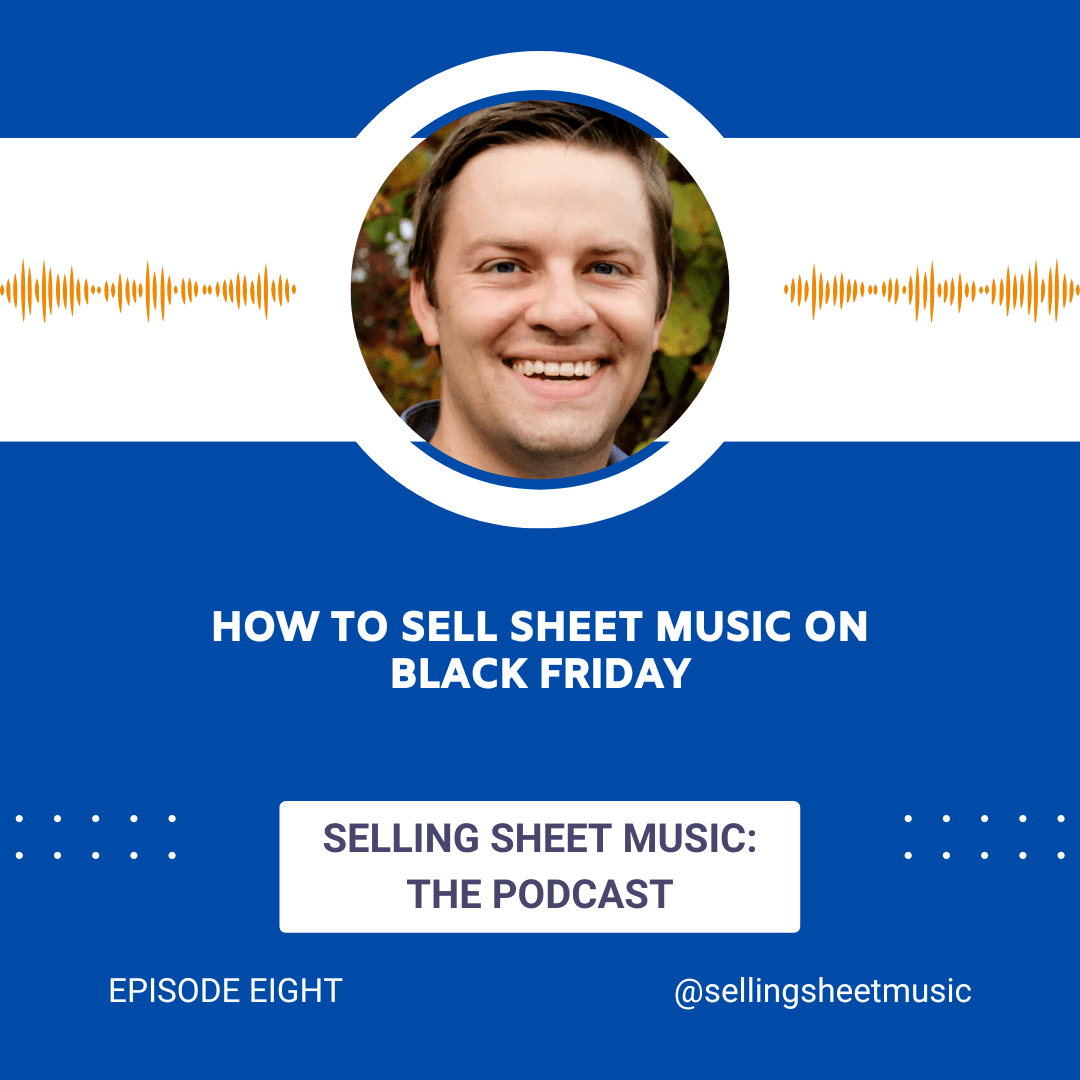How to Sell Sheet Music on Black Friday
Episode Description:
In the US, it’s consistently the biggest shopping day of the year, and yet most sheet music publishers don’t take advantage of Black Friday. In this episode, we’re going to take a look at various strategies you can use to give your music sales an extra boost heading into the holiday season and the end of the year.
Featured On This Episode:

Garrett Breeze
Garrett Breeze is a Nashville-based composer, arranger, publisher, and the founder of Selling Sheet Music. His credits include film, television, video games, Broadway stars, major classical artists, and many of the top school music programs in the U.S. Visit garrettbreeze.com for more information or to book Garrett for a commission or other event.
Episode Transcript:
*Episode transcripts are automatically generated and have NOT been proofread.*
Historically, Black Friday was this day for retailers who’ve been in the red all year to finally turn a profit and kick off the holiday season and make it into the black, if you will, by using big deals to draw large numbers of people into the store. But even before the pandemic, things were shifting away from this literal mob mentality of waiting outside the store at midnight.
Cyber Monday was introduced in 2005 to create a similar event for online retailers. And then in 2010, Small Business Saturday was created, ironically, by American Express, who is famously not a small business, to boost local mom-and-pop stores feeling the squeeze of the Great Recession. Since then, brands have expanded Black Friday sales into the whole week, or even in some cases, the whole month.
So my point is, Black Friday can be whatever you need it to be. And if you take nothing else out of this episode, it’s that you should do something. It makes no sense for us as publishers to ignore a day when the world is conditioned to go shopping, especially since most of us are also small businesses and online businesses.
The challenge we have is that sheet music sales tend to be very need-driven, and by the time we reach the end of November, the need is typically not very pressing. If you think about where it lands in the school year, most people are just a week or two away from their holiday concerts and final exams, so they tend to just kind of be in survival mode. They’ll need new music eventually, but it’s not really top of mind.
So with Black Friday sales, I recommend you focus on what’s coming next. Focus on the music people will need after Christmas, and then use your sales to remind them of that. The other thing that’s hard is that Black Friday sales have to be big.
You want to create this sense of urgency, so customers feel like they can’t wait because a deal is so good. But that can be hard to do with a product that’s generally cheap, like sheet music. You know, if the regular price for one of your piano solos is $5, you can sell it for 50% off, and that’s a great sale, but it’s not like that $2 difference is going to make everyone want to crash your website.
That being said, this all pretty much makes Black Friday a low-risk endeavor. You know, if you ran a giant sale during your peak buying time, then that might eat into your profits, but since this is kind of in between those peak buying seasons, it’s a chance to get sales where maybe you wouldn’t typically. The worst case scenario is that the campaign is a flop and you don’t sell anything.
But in terms of your brand and your visibility, it’s still good to advertise. You know, nobody’s going to think less of you for having a Black Friday sale. If anything, it’s one of the few times of the year where people expect to be sold to, and frankly, want to be sold to.
Now, we’ve talked in previous episodes about how selling sheet music requires a different approach than your typical e-commerce store. However, when it comes to promotions like this, I think you can pretty much look to any online store for inspiration. So what are your options? The first thing to think about is how long do you want your campaign to run for? Some companies run Black Friday sales for the whole month, some for a week, some for a day.
I think it largely depends on if you’re trying to sell to your existing customers or if you’re trying to reach new ones. If you’re trying to sell primarily to your email list, for example, I don’t think you need to have a particularly long sales event because everyone’s going to open the email and then decide yes or no. On the other hand, if you’re running a social media campaign and advertising and trying to reach new customers, then you might need to leave things open for a little bit longer.
But once you decide who you’re trying to sell to, you can sort of work backwards to see how long you need to keep the sale running and what you need to do to get the word out. Next, you’ve got to figure out the specifics of your offer. Because it’s Black Friday, it’s either got to be big or it’s got to be creative.
I tend to think the store-wide coupon codes are not going to be the most effective way to go. That’s sort of the most obvious approach. And although I think it’s better than nothing, people are inundated with emails and coupons from basically every store in America with their 50% off code.
So again, since we’re not talking about huge dollar amounts here, I’m not so sure that really moves people. But in the interest of thoroughness, let’s talk about how you do it. So if you’re running your own website, you can go into WooCommerce and get the actual coupon code set up in about two minutes and have it running store-wide.
That part’s actually really easy. What takes longer is creating the marketing and the branding to go with it. So maybe you have a couple ads for social media or a pop-up or a landing page or something like that.
But if you’re selling on one of the big three self-publishing platforms, you don’t have the ability to generate your own coupon codes. And so these sort of across-the-board discounts don’t really work. I suppose you could go through and manually edit the prices of some of your pieces to create a special Black Friday sale.
But it’s not going to appear like a price cut on the front end. And so I think that has the potential of being confusing. However, these sites often run their own promotions, which you can piggyback on using affiliate marketing programs or even just by passing the information on to your fans.
So that’s one reason why you should always sign up for the marketing emails of any site that you sell your music on so you can be aware of these site-wide sales and coupons and events as they happen. So that’s my two cents on coupon codes. It’s better than nothing, but probably not going to move the needle all that much.
What else can you try? Another common strategy is to run a longer campaign, maybe for a week or a month, with a different product deeply discounted each day. You could do a buy one, get one free type of situation, or you could put together a special bundle of music that’s only available during Black Friday. Another approach is to get creative with add-ons.
This is especially useful if you’re marketing to repeat customers that have already bought a lot of your music. So you’ve got to think about what could you offer that might pique their interest. Maybe you could give a private lesson to everyone that buys a piece.
Or if you do live shows, you could include tickets. You could sell t-shirts or other merch. For songwriters, things like handwritten lyric sheets or vinyl editions of recordings are always popular.
Composers might offer a signed score or a handwritten sketch of the piece. I would look to Patreon or Kickstarter for ideas and look at the kinds of things musicians are offering there as bonuses for backers. And I think those are the kinds of things that you might incorporate into a Black Friday sale.
And I should mention too, even if you don’t have a website, you can still use an email list or a social media account to run some of these offers. Beyond that, I would just be strategic about the kind of music you’re promoting. Anything that can be bought as a present for someone else is probably a good idea.
Anything that’s going to be useful in the first six months of the year, like Easter or graduation, is probably a good idea. Anything somebody could play at home during the winter is a good idea. And I would probably play to the extremes a little bit too.
You could discount your most popular pieces because you know those are going to sell. But you might also consider trying to give one of your least popular titles a boost and see if you can move more copies at a lower price. We are fortunate because unlike retailers, we’re not dependent on Black Friday to make ends meet.
We can use it as an opportunity to experiment with different marketing approaches and then take that experience and apply it year round. So best of luck to all of you with your Black Friday sales. Let me know what you try.
Let me know what works, what doesn’t work. Maybe we’ll do a follow-up episode next year.
